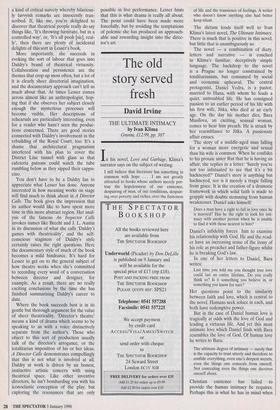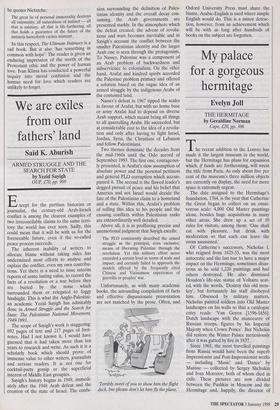The old story served fresh
David Irvine
THE ULTIMATE INTIMACY by Ivan Klima Granta, £12.99, pp. 387 In his novel, Love and Garbage, Klima's narrator says on the subject of writing: I still believe that literature has something in common with hope ... I am not greatly attracted to books whose authors merely por- tray the hopelessness of our existence, despairing of man, of our conditions, despair- ing over poverty and riches, over the finiteness
of life and the transience of feelings. A writer who doesn't know anything else had better keep silent.
The dictum lends itself well to Ivan Klima's latest novel, The Ultimate Intimacy. There is much that is positive in this novel, but little that is unambiguously so.
The novel — a combination of diary, letters and narrative — is couched in Klima's familiar, deceptively simple language. The backdrop to the novel is a Prague no longer constrained by totalitarianism, but consumed by social and economic upheaval. The central protagonist, Daniel Vedra, is a pastor, married to Hana, with whom he leads a quiet, untroubled life. He has consigned passion to an earlier period of his life with his first wife, Jitka, who died at an early age. On the day his mother dies, Bara Musilova, an exciting, sensual woman, comes to hear him preach. He is struck by her resemblance to Jitka. A passionate affair ensues.
The story of a middle-aged man falling for a woman more energetic and sexual than his wife is common. When he confides to his prosaic sister Rut that he is having an affair, she replies in a letter: 'Surely you're not too infatuated to see that it's a bit hackneyed?' Daniel's story is anything but hackneyed, nor is it merely a tragic falling from grace. It is the creation of a dramatic framework in which solid faith is made to grapple with doubts stemming from human weaknesses. Daniel asks himself:
Does a man have a right to fall in love once he is married? Has he the right to look for inti- macy with another person when he is unable to find it with those nearest to him?
Daniel's infidelity forces him to examine his relationship with God. He and the read- er have an increasing sense of the irony of his role as preacher and father-figure whilst he is breaking God's law.
In one of her letters to Daniel, Bara writes:
Last time you told me you thought true love could last an entire lifetime. Do you really think so? Is it something you believe in, or something you know for sure?
Her questions point to the similarity between faith and love, which is central to the novel. Humans seek solace in each, and both have redemptive power.
But in the case of Daniel human love is tragically at odds with the love of God and leading a virtuous life. And yet this most intimate love which Daniel finds with Bara resembles the love of God. Of human love he writes to Bara:
The ultimate degree of intimacy — surely that is the capacity to trust utterly and therefore to confide everything, even one's deepest secrets, even the things one conceals from oneself. Not concealing even the things one deceives oneself about.
Christian existence has failed to provide the human intimacy he requires. Perhaps this is what he has in mind when he quotes Nietszche:
The great lie of personal immortality destroys all rationality, all naturalness of instinct — all that is salutary, all that is life-furthering, all that holds a guarantee of the future of the instincts henceforth excites mistrust.
In this respect, The Ultimate Intimacy is a sad book. But it also 'has something in common with hope'. The reader is given an enduring impression of the worth of the Protestant ethic and the power of human love. Ivan Klima has conducted a powerful inquiry into moral confusion and the human need for love which readers are unlikely to forget.



















































 Previous page
Previous page